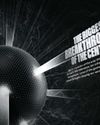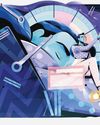
The standard model of our Universe may be showing some cracks. Several fundamental cosmological observations are contradicting each other. For instance, the Universe appears to be expanding 10 percent faster than it should be, according to observations of the leftover heat from the Big Bang.
It’s perfectly possible that the contradictions will disappear as our estimates of cosmic parameters improve.
But it’s also possible that the contradictions won’t go away and that our fundamental picture of the Universe is about to undergo a radical revision, perhaps to include invisible, ‘dark’ components as complex as atoms, stars and galaxies.
ADDITIONAL INGREDIENTS
Cosmology is the ultimate science. It deals with the birth, evolution and fate of the Universe. The standard model consists of several ingredients: the Big Bang, dark matter, dark energy and inflation.
First, take the Big Bang. Astronomers can see that the galaxies – the basic building blocks of the Universe of which the Milky Way is one – are flying away from each other in the aftermath of a titanic explosion. They also observe that the Universe is permeated by relic heat – the cosmic background radiation. Together, these two observations tell astronomers that the Universe was smaller and hotter in the past. In fact, according to the standard picture, the Universe was born in a blisteringly hot fireball 13.82 billion years ago and has been expanding ever since, with the galaxies congealing out of the cooling debris.
Esta historia es de la edición New Year 2021 de BBC Focus - Science & Technology.
Comience su prueba gratuita de Magzter GOLD de 7 días para acceder a miles de historias premium seleccionadas y a más de 9,000 revistas y periódicos.
Ya eres suscriptor ? Conectar
Esta historia es de la edición New Year 2021 de BBC Focus - Science & Technology.
Comience su prueba gratuita de Magzter GOLD de 7 días para acceder a miles de historias premium seleccionadas y a más de 9,000 revistas y periódicos.
Ya eres suscriptor? Conectar

THE WORST IDEAS OF THE 21ST CENTURY
NOT ALL IDEAS CAN BE HITS. ALONGSIDE GROUND-BREAKING INNOVATIONS, 21ST-CENTURY SCIENTISTS HAVE HELMED THEIR SHARE OF WILD TECH FLOPS, DUBIOUS THEORIES AND OVERHYPED BREAKTHROUGHS. HERE ARE THE BIGGEST TO FORGET

10 IDEAS THAT WILL SHAPE YOUR NEXT 25 YEARS
Predicting the future is considered a fool's game. But it's one many of us like to play.

THE BIGGEST BREAKTHROUGHS OF THE CENTURY
We're a quarter of the way into the new century. To mark this milestone, we asked the UK's top minds to highlight some of the game-changing scientific breakthroughs shaping our world since the year 2000

DO THE SCIENCE COGNITIVE SHUFFLE
Trouble sleeping? A lot on your mind? Use this trick and sedate your synapses

WHAT DETERMINES HOW MANY ABS I CAN GET?
Assuming you're a human being, you have exactly the same number of abs as everybody else: two.

HOW CAN I IDENTIFY MY PSYCHOLOGICAL BLIND SPOT?
In the 1950s two American psychologists, Joseph Luft and Harrington Ingham, proposed a way of thinking about psychological blind spots - things you don't know about yourself - that they called the 'Johari Window' (the term is a combination of their first names).

How can I change my personality?
Want to become more confident, extroverted or assertive? Science shows that with a few simple changes, you can unlock your best self

Could your cosmetics be harming your health?
Cosmetic companies are phasing out microplastics and so-called 'forever chemicals' to help protect consumers.

extraterrestrial US Congress is talking about activity again. Is the truth really out there?
Despite several testimonies, the question remains frustratingly unanswered

Map of 100 million human body cells revealed
Over three dozen new studies mark significant milestone towards complete Human Cell Atlas